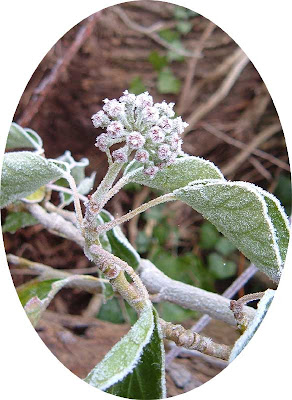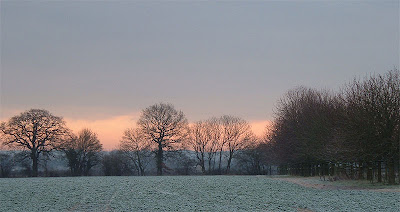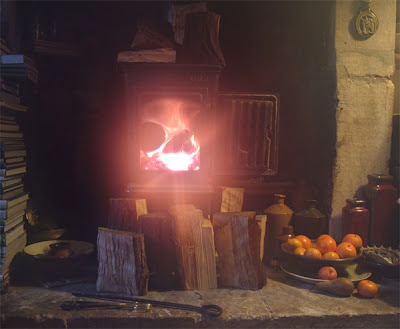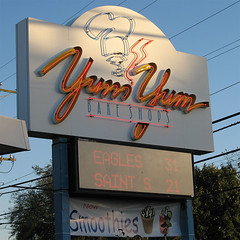Breath snapping, air fogging, lip stinger, warmth filcher, sun muffler,
deep bone gnawer, blood thinner, steal-my-whistle
Earth cleanser, rime duster, bitter diamonds, tear freezer,
white assasin, kill-my-lover

lace threader, seed trigger, hoar stick, brittle barked, glitter sprinkler,
tree ripper, Gardener's Mercy

song killer, crystal maker, leaf snapper, stealth chilling, finger numbing, lip mumbling, stone breaking,
earth cracking, wouldn't-kick-a-dog-out
colour leacher, ice weaver, boney dancer, Sharp Jack
steely creeper, puddle crazing, eye glazer, fur stiffener, Wreath-of-Tears

fire maker, heart warmer, Pointy-faced-Mary peers in the window
tea drinker, soul reviver, Mother's-heal-all
Those of you in northern climes are going to laugh at this but I thought it was very exciting.
Yesterday when we departed the homestead for our appointed rounds, there was a light sheen of frost on all the roof tops and the grass sparkled as tiny ice crystals caught and reflected the morning sunlight. The temperature had brushed down to the low thirties the night before and the air had that fresh cold sense that winter was actually a possibility here on the Gulf coast.
I had just noticed on Sunday that some trees were finally displaying orange, red and deep purple leaves. I immediately thought of Chris VanAllsburg's The Stranger. What a morning to read that book with kids!


Poor Farmer Bailey is horrified when he realizes that his truck has hit something. A dazed man lies in the road so Farmer Bailey takes him home to be cared for. The doctor cannot discover anything wrong with him (he cannot even get a temperature reading because his thermometer seems to be stuck at the bottom) but the poor man has lost his memory. He is a gentle spirit though and settles in to life on the farm. Fall has arrived in the surrounding countryside but summer seems without end on the Bailey farm. Despite his contentment with the Baileys, wisps of memory are tugging at the stranger's mind. This is a delightful mystery that will stay with readers long after the last page is turned.
The Stranger by Chris Van Allsburg, Houghton Mifflin, 1986
This morning, I had to drive S to school because she opted to stay home and finish a bit of homework she'd forgotten rather than take the bus that comes an hour before school opens. (I don't quarrel with her decision, which was sound, or with her priorities, which were to spend all last night studying for a major unit test in Spanish, and I enjoy time alone in a car with my girlies.)
On the way, I was still pondering what poem to use today for Poetry Friday. And S and I began to talk about the changing leaves on the trees. S's favorites are the "leaves that look like peaches — gold, with a hint of pink". (I like the dark eggplant-purple of the occasional ornamental tree, but only when it's contrasted with greens; they lose their magic for me when everything goes to rust.) And it hit me that the poem I most wanted to share today was Robert Frost's "Nothing Gold Can Stay."
"That's a sad poem," said S. "It was used in The Outsiders. Have you ever read that book?"
The answer is that I haven't. In the time and town where I grew up, once you were done with children's books, you moved on to grown-up titles. S.E. Hinton's The Outsiders, first published in 1967 (when I was three), was clearly around when I was a teen, but I never heard of it until S read it in middle school. But the poem plays a key role in the book in the relationship between the characters Ponyboy and Johnny. And because S so strongly associates the poem with the characters in the book, she finds it sad.
And really, it is sad, or at least fatalistic. But first the poem, then the discussion:
Nothing Gold Can Stay
by Robert Frost
Nature's first green is gold,
Her hardest hue to hold.
Her early leaf's a flower;
But only so an hour.
Then leaf subsides to leaf.
So Eden sank to grief,
So dawn goes down to day.
Nothing gold can stay.
On the surface, this is not truly a poem about autumn. The first four lines are about spring, and early growth of plants and leaves, when the first yellow greens appear on the trees. In the fifth line, the leaves are just leaves, but use of the word "subsides" shows a settling or falling sort of motion. And then the sixth line is the "turn," where Frost gets to his real topic. The subsidance of leaves reminds him of the fall of man in the Garden of Eden. Dawn is lost, but day remains. And then that last, killer line with a fatalistic ring to it, decrees that "Nothing gold can stay." It can be taken to mean that nothing can stay gold, and S.E. Hinton's character, Johnny, says that it's about the importance of appreciating the things you loved in youth, and about staying "golden", or young. But I think it means that nothing can stay young.
For me, the poem is about the transient nature of youth, with a hint of loss. And in my mind today, remembering this poem (I don't yet have it committed to memory, but I sure remembered the leaf references), I thought that "Nothing gold can stay" suited the brilliant-gold of the autumn leaves quite well. And so, evidently, did Robert Frost. Here are the last three lines of this poem from an earlier draft, at a time when the poem was called "Nothing Golden Stays":
In autumn she achieves
A still more golden blaze
But nothing golden stays.
Today's poem, "Nothing Gold Can Stay," was first published in 1923, in The Yale Review. But Frost played around with it for several years, and several earlier versions of it exist. The earliest of these other versions was sent to a friend in 1920, and ended as you see above. Frost's initial focus was on the evanescent quality of new growth. Buds are golden before green. Leaves appear to be flowers before they unfold and "subside" to be leaves. Trees burst forth in color again in the fall, then the leaves subside once and for all to earth. In later revisions, he decided to universalize the poem more. By introducing the idea of Eden, Frost injects a human element into the poem without spelling it out. The sinking of Eden is a reference to the "fall of man," but it echoes the idea of transience: Eden was short-lived, but the rest of man's time on earth has been much longer. Dawn, usually the time when the sun rises, is describes in falling terms as well, but dawn "goes down" to the bright light of day. Is that really a decline, or an improvement? Again, dawn is transient and over quickly, but day lasts far longer. Perhaps, then, Eden was transient, and the longer time spent after the fall is to be preferred? Is our preference for "gold" really such a good thing? Is not the long day better than the short dawn? Is not the summer longer and more durable than the budding spring? Is it not worth our while to recognize that youth's a stuff will not endure* and to appreciate our adulthood?
The poem concludes strongly, for a number of reasons:
"Nothing gold can stay."
Why does that line pack such a wallop?
Well, first, looking at metre, it is different than all the rest. The first seven lines are essentially iambic (a two-syllable poetic foot in which an unstressed syllable is followed by a stressed syllable, ta-TUM), although the first line has an oddball because "nature" is usually read NAture, not naTURE. The first seven lines each have six syllables to them. That last line has only five. And it's trochaic, with a truncated ending. (Don't panic - it means that it has two-syllable feet that are trochees, in which a stressed syllable is followed by an unstressed syllable, TUM-ta, but that the last foot only has one syllable, which is accented, so the line reads TUM-ta TUM ta TUM.)
It's written in rhymed couplets. Not just any rhymed couplets, either: but end-stopped rhymed couplets (which is to say that each line logically pauses at the end, where the commas and periods and semicolon can be found). This could easily become sing-songy in the wrong hands, yet Frost manages his images well enough that I find myself not truly noticing the rhyminess of it on a conscious level. Particularly if I read it aloud (as one should), where the pause after a comma is not as long as that created by a semicolon or a period. Especially since the lines "So Eden sank to grief,/So dawn goes down to day" form a single sentence, and don't rhyme with one another. Instead, they create a break before that last line, which stands alone.
Second, looking at word choice, the line begins with a negative: "Nothing." While there have been hints at loss and falling and evanescence throughout the poem, creating a vaguely melancholy tone, this word is aggressively negative. Also, as written that last line can be read as a command, rather than as a commentary on loss. It is a far broader statement than any that comes before it, generalized as it is to all things (in the negative). Gold cannot stay.
A possible stretch: While folks don't usually interpret the poem this way, one could stretch so far as to say that gold in that last line might not refer to the "just-Spring" qualities in the poem (with a nod to e.e. cummings), but could refer as well to money, which one cannot, after all, take with them.
For some other commentaries on the poem, check out these essays over at Modern American Poetry. The second one, analyzing it from a linguistic point of view, is fascinating to me, although I'm sure most people don't have the patience for it.
What think you?
* The quote "Youth's a stuff will not endure" is the closing line of "O Mistress Mine" by William Shakespeare. It was a song sung by the character Feste in Twelfth Night.


To check out the snowflakes featured in today's blogosphere, click on the Robert's Snow button to the left. The girls at 7-Imp have a lovely image of Alissa Imre Geis's snowflake, “Hope in Winter,” which features the first stanza of Emily Dickinson's
Hope is the Thing With Feathers. In addition, Jules and Eisha have also been keeping an
ongoing list of blog posts thus far featuring snowflakes and the artists who created them.
While there, check out their
Poetry Friday post today, all about Alice. Yes, the one from Wonderland. No, not the one from the Restaurant.

Good morning. Over at my Live Journal blog, I'm hosting this week's Poetry Friday roundup. As regular readers here know, every Friday is Poetry Friday at
Writing and Ruminating.
Today, I'm feeling some John Keats; specifically, his Ode
"To Autumn", which features three stanzas of eleven lines each. All three have the same rhyme scheme for the first seven lines (ABABCDE), but stanza one (DCCE) ends a wee bit differently than two and three (CDDE). Such is the malleability of the Ode. What makes this poem special is not, however, the rhyme scheme; it is Keats's use of language and imagery, beginning with his decision to address the poem to Autumn itself, and to speak about it as a living, present thing.
This poem is lovely as is, but reading it aloud will give you further appreciation for the images and the sounds within it. I wish I could find Alan Rickman reading it, because his voice can turn me into a pile of mushy goo (don't believe me? Have a listen as he reads
Shakespeare's Sonnet 130. But I digress.) If you feel funny reading this aloud to yourself, then you can
listen to Nicholas Shaw read it for the BBC.
To Autumnby John Keats
I
Season of mists and mellow fruitfulness,
Close bosom-friend of the maturing sun;
Conspiring with him how to load and bless
With fruit the vines that round the thatch-eves run;
To bend with apples the mossed cottage-trees,
And fill all fruit with ripeness to the core;
To swell the gourd, and plump the hazel shells
With a sweet kernel; to set budding more,
And still more, later flowers for the bees,
Until they think warm days will never cease,
For Summer has o’er-brimmed their clammy cells.
II
Who hath not seen thee oft amid thy store?
Sometimes whoever seeks abroad may find
Thee sitting careless on a granary floor,
Thy hair soft-lifted by the winnowing wind;
Or on a half-reaped furrow sound asleep,
Drows’d with the fume of poppies, while thy hook
Spares the next swath and all its twinèd flowers:
And sometimes like a gleaner thou dost keep
Steady thy laden head across a brook;
Or by a cider-press, with patient look,
Thou watchest the last oozings hours by hours.
III
Where are the songs of Spring? Aye, where are they?
Think not of them, thou hast thy music too,—
While barred clouds bloom the soft-dying day,
And touch the stubble-plains with rosy hue;
Then in a wailful choir the small gnats mourn
Among the river sallows, borne aloft
Or sinking as the light wind lives or dies;
And full-grown lambs loud bleat from hilly bourn;
Hedge-crickets sing; and now with treble soft
The red-breast whistles from a garden-croft;
And gathering swallows twitter in the skies. How much do I love some of his descriptions here? So very much that I'm thinking hyphenations should be used far more in everyday life. The evocativeness of "the mossed cottage-trees" alone is enough to stop me in my tracks. The entire second stanza is staggeringly gorgeous, speaking of the autumn hay. "[O]n a half-reaped furrow sound asleep,/Drowsed with the fume of poppies . . ." is better imagery and poetry than many can muster in the whole of their poems, and it's only part of one sentence here (and a fragment, at that).
Keats wrote the poem after spending some time out of doors on a fine autumn day. How do I know? Well, he wrote to a friend of his named Reynolds, and said so: "How beautiful the season is now—How fine the air. A temperate sharpness about it. Really, without joking, chaste weather—Dian skies—I never lik'd stubble fields so much as now—Aye better than the chilly green of the spring. Somehow a stubble plain looks warm—in the same way that some pictures look warm—this struck me so much in my Sunday's walk that I composed upon it."
I believe that today, I'll take a walk and see what autumn has to offer.
I sha'n't be gone long.—You come too.*
 And one more thing: Don't forget to check out the featured snowflakes for the Robert's Snow auction, which you can find listed at Seven Imp (or by clicking the pretty picture to your left - it's a button!)
And one more thing: Don't forget to check out the featured snowflakes for the Robert's Snow auction, which you can find listed at Seven Imp (or by clicking the pretty picture to your left - it's a button!) *Yes, that last italicized bit was Robert Frost, from one of my favorites of his poems,
"The Pasture". You can read the full text of that poem
in a prior post at my LiveJournal blog. Well-spotted, if you already knew that.
 Today is my son’s 19th birthday and I am sending a shout out to him to wish him every good thing today and always. He is a wonder to me, a young man grown out of my blonde angel baby; a serious, loyal friend emerging from a playful toddler marching to his own drummer; a smart and thoughtful son from the ticklish baby I carried to Africa and back. Happy birthday, Alex. I look forward to watching what you will be and do next. Here’s a poem to guide you on your way.
Today is my son’s 19th birthday and I am sending a shout out to him to wish him every good thing today and always. He is a wonder to me, a young man grown out of my blonde angel baby; a serious, loyal friend emerging from a playful toddler marching to his own drummer; a smart and thoughtful son from the ticklish baby I carried to Africa and back. Happy birthday, Alex. I look forward to watching what you will be and do next. Here’s a poem to guide you on your way.
A Time To Talk
by Robert Frost
When a friend calls me from the road
And slows his horse to a meaning walk,
I don't stand still and look around
On all the hills I haven't hoed,
And shout from where I am, "What is it?"
No, not as there is a time to talk.
I thrust my hoe in the mellow ground,
Blade-end up and five feet tall,
And plod: I go up to the stone wall
For a friendly visit.
From: Schmidt, Gary D., ed. 1994. Poetry for Young People: Robert Frost.
Illus. by Henri Sorenson. New York: Scholastic. ISBN 0439254191.
FYI: An audio reading of the poem is also available here.

















What beautiful frosty photo's.
Bet Toby will like your mug when he see's it!
Hope all is well for you G.
P.xx
Beautiful post.
carolyn
willow house
Hi PG,
I found you blog through 'Muddy Shoes'. I L O V E those pictures of the fire and cup of tea - bliss!
There have been some wonderful frosts, sadly I have been too full of this cold to get out and enjoy them but captain ruperts has and looks very handsome out in the frost.
Lovely blog entry, very evocative of crackly cold and fireside cuppas!
Couldn't wait to get to the next photo you had displayed. Great post.
Hugs,
Connie
Yup, that's what I have been trudging through the past couple of days with the dogs! You are so lucky having a wood-burning stove, how comforting that looks.
Did you write the poetic piece - it's lovely, how evocative!
I have been so enjoying your blog since I found it via The Hermatage.
Love your work!
Take care,
Alison x
Wow that is some frost Gretel. We don't get frost lke that here, too close to the sea, in the 4 years I have lived here I have never had to scrape my windscreen!
Loving you taste in mugs!!
Toby.
Thank you for this beautiful post - your artist's eye obviously works for photos as well.
Oh...I don't know what is lovelier, the words or the pictures. I take that back, they are equally beautiful and go hand in hand. (hand in glove?)
Such absolutely gorgeous photos. I will come back several times to look at these and to feel the warmth of that fire.
thanks.
Oh, just look at the beauty that you have shared. The pictures really do just let me have a holiday journey away from this city.
And your word just kept me reading, faster and faster. Glad to see that cup at the end. Just as I was sipping my very own hot cup of PG tips.
Hoping that Christmastime will be very good to you.
xo
Looks like a six dog night for sure!
Hope you are staying warm and cozy inside...
(())
Francie
I love your pictures!! You've captured the moment wonderfully.
Blessings,
Debbie
in the onion patch
What a wordsmith you are :) ... and very lovely pictures. Am writing from a library on our travels and we are seeing similar frostinesses on waking in the mornings :) Good old cuppatea too eh? xR
Lovely, lovely, lovely! Beautiful photos and deliciously evocative wordage to boot :) (I know wordage isn't strictly a word, but I like it!!) Have missed you - will be in touch v. soon xxx
What a lovely photo of the frost leaf. We had a frosty day Friday and I was tempted to take a photo like that, but lazy me, I stayed inside where it was warm!
Thanks and hugs from Laura at Amongst The Oaks
Marvellous post ... beautiful photos and words.
Fabulous frosty fotos..
Are you wielding that paintbrush?
Will be in touch proper.. soon.
Mx
So nice to see a picture of your wood burner roaring away. Jack frost has been around here the last few days too, good to see him about ! ~ love julia x
Your words are so apt and beautifully rhythmic, like the noise of a train chugging along. We were in the middle of the most stunning Northumbrian countryside last Saturday and all around was as white as could be. It was the most breathtaking scene imaginable.
And whilst I'm at it, if I'm not around here again before it - Merry Christmas!
Merry Christmas!!
Fab post!! Beautiful words (I was blown away by them) and gorgeous photos! I feel so seasonal after reading it. Merry christmas!
Merry, Merry Christmas, Gretel ... in your absolutely fabulous part of the world ... in your cottage surrounded by amazing artwork (your own). It's been such a gift to read your blog (and send your cards) this year!
Now THAT'S a mouthful! Whew! Great photos. Cindy at Rosehaven Cottage
I took in each word, rolled it about on my tongue, spoke it aloud and savoured each in turn. Incredible writing!
I send warm wishes and hugs from the west coast and hope you have a joyous festive holiday season and a grand 2008.
What a wonderful post and pictures! Have a very Merry Christmas :)
tea
xo
Amazingly evocative pictures.
Wish I were there.
Such frosty loveliness.
Happy holidays to you
from Vienna,
where the frost on the trees of the hills ringing the west of the city is painting its icy pictures too.
I really love that Trees on Sunrise picture !! Other pics are great too !